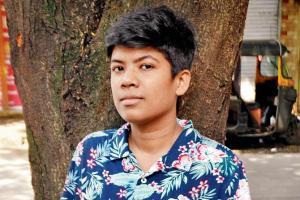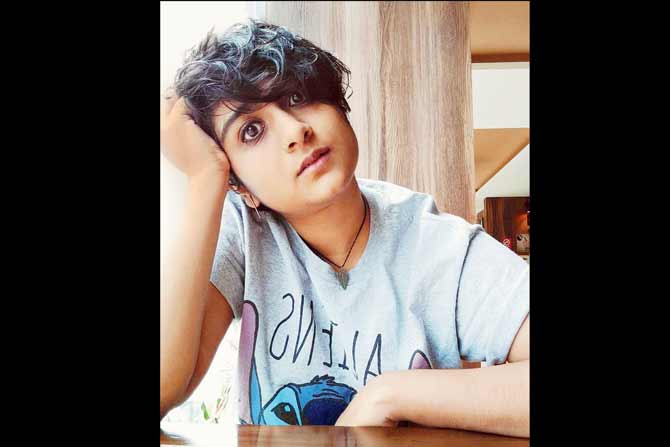A Mumbai illustrator's new zine explores the relationship that queer people share with their clothes

Dan Rebello. Pic/ Datta Kumbhar
Mumbai-based illustrator Sanika Dhakephalkar has a chock-a-block schedule this weekend. She has flown to Bengaluru to attend the Gender Bender festival curated by Sandbox Collective, a creative services organisation, in association with Goethe-Institut Max Mueller Bhavan. As the name suggests, the event aims to showcase new works of art around gender and encourage conversation around taboo subjects. The 23-year-old is one of the grantees chosen from a pool of entries. While discussing the fest over the phone, Dhakephalkar casually throws in a nugget of information. "I love a pair of loose, comfortable anti-fit jeans and shirt. And, that's what I'm wearing." In ordinary conversation, her choice of outfit would have never cropped up, because, well, how does it matter? Unless we're discussing a fashion event. But, if you were to ask Dhakephalkar, clothes matter. "For a person who does not conform to the binary idea of gender, it matters all the more. The thing is, clothes carry gender connotations, and when you challenge that, you are questioning societal norms." To drive home the point, she has created an interactive sticker zine, The Rainbow Book, that explores the relationship that trans, non-binary and gender non-conforming people share with their clothes. The book will be unveiled at the festival.
As somebody who is exploring her sexuality, Dhakephalkar wants to loosen the conversation on what people should wear or shouldn't. Her work is essentially an activity book in two forms. The first part invites the reader to be a part of the discourse. It comes with stickers (that look like clothes) embedded with magnets, in which the reader can dress up the person the way they want. "Each artwork is situational. Let's say, I've presented a wedding scenario and given four options of clothing. You, as a reader, can choose what you think they ought to wear. The idea is to directly interact with the artwork," explains Dhakephalkar. In the second part, the person featured gets a voice. Here, they discuss what they would want to wear as opposed to what others think. In doing so, they also share their journey.

The artist has presented a wedding scenario and given options of clothing. The reader can choose the dress they deem fit for the person
Thane-based educator Dan Rebello is one of them. The 23-year-old identifies as non-binary. But, the authorities at the Thane school, where she teaches, find it difficult to wrap their head around this. At work, she is expected to wear "respectable Indian outfits". It's almost like wearing a costume, she says. "On some days I'm fine with them. But, when my dysphoria sets in, I feel suffocated. I feel like I'll disintegrate and fall apart." Outside of work, Rebello prefers to dress up in mostly androgynous outfits. Her wardrobe has a sizeable collection of suspenders, loose pants and baggy shirts with floral prints. "I mostly shop from the men's section. But, that's also a problem because given my diminutive frame, even the small size is large for me," she says. Many of her outfits have been hand-stitched in the absence of the right size at stores.
Dhakephalkar says all seven participants were given keywords—gender, clothes and Mumbai city—and also the free rein to chronicle their experiences. As an illustrator, her job was to put it to paper with sensitivity. "When you're queer, you have more access to a variety of clothing because you do not subscribe to gender roles. But, that also comes with its own set of challenges."
In the book, Rebello articulates her everyday ordeal. She has been refused entry to the ladies washroom, ordered to vacate seats reserved for women in buses or deboard the ladies compartment in trains. Security personnel at malls ask her to take the men's queue. All of this because "she looks like a man". She says, "In such situations, I'm compelled to speak up and say that I am a woman. Instead of apologising, they laugh at my face." It's common for strangers to stare at her chest to ascertain her gender.

Sanika Dhakephalkar
Swapnil Alizeh knows this all too well. The 22-year-old city-based actor, who also features in Dhakephalkar's book, loves wearing a saree. So much so, that people in his queer circle often rib him to "get over it". He says, "I just love it. It makes me feel liberated and confident even." Having said that, Alizeh's preferred choice of outfit in the Rainbow Book is a pair of black palazzos with a deep-necked, shimmery top with shoulder pads, of which Dhakephalkar has created an illustration. "When Sneha asked me what I would love to be seen in, I sent her a picture of me in the black outfit, because it's glamorous and sexy. As a gender fluid actor, I want to feel as accepted in a palazzo as I would in a tux." His Instagram handle is 'Girl with a Beard'. He often receives DMs from followers seeking fashion tips.
 In the second part of the book, the person featured gets a voice. Here, they discuss what they would want to wear as opposed to what others think. In doing so, they also share their journey
In the second part of the book, the person featured gets a voice. Here, they discuss what they would want to wear as opposed to what others think. In doing so, they also share their journey
While Alizeh and Rebello might be queer influencers, Dhakephalkar was clear that she needed to represent the underrepresented, too. "After a point, I stopped looking online for participants. I've even featured trans people whom I happened to meet on the street." In the last couple of months, she admits there have been lessons for her, too. "You tend to classify trans people in one category as if they have the same consciousness. But, there are a thousand aspects to a person's identity. "Although, the project is about clothes, the message to take home is to look beyond. "Clothing does not need to check gendered boxes."
Catch up on all the latest Mumbai news, crime news, current affairs, and also a complete guide on Mumbai from food to things to do and events across the city here. Also download the new mid-day Android and iOS apps to get latest updates
 Subscribe today by clicking the link and stay updated with the latest news!" Click here!
Subscribe today by clicking the link and stay updated with the latest news!" Click here!







